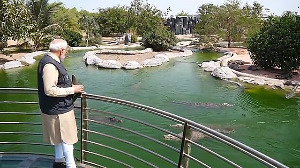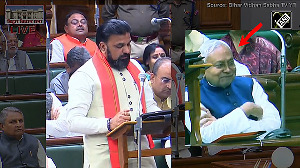A wry joke about inflation was doing the rounds among economists in India on Friday.
The United Progressive Alliance, India 's ruling coalition led by the Congress party, is alarmed about inflation, which hit a seven-year high of 8.75 per cent at the end of last month, according to government figures released on Friday.
The rise in inflation could not have come at a worse time for the government, which needs to call a general election by May next year in a country whose hundreds of millions of poor voters are sensitive even to incremental increases in the cost of living.
Indian inflation races to seven-year high
Engaging India: Hard graft
But the best thing the government could do, or so the jokes goes, is nothing. The base effect from increases in inflation this year will be so high that it will mute any percentage increase in prices in the opening months of next year. "Voters have short memories so who knows, such a strategy could work," said one economist in Mumbai.
The government is unlikely to be amused by such theories. But in one sense, those behind the joke are right. With inflation likely to hit 10 per cent in figures for the first week of June scheduled to be released next Friday, the near-term battle against inflation in India has been lost. The struggle has now shifted to how to bring it under control in the medium-term. "The government has run out of options - the situation is beyond any short-term fix. They are now fighting next year's inflation battle," said A Prasanna, an economist with ICICI Securities in Mumbai.
India helps recharge batteries and open eyes
India urged to raise civil servant pay
The sudden rise in inflation in the first half of the year - it stood at just 4.5 per cent in January - has come despite the best efforts of the government. India 's ministers have experimented with short-term administrative measures to try to stop price rises, including introducing export curbs on essential items and suspending futures trading in staple foods such as rice and wheat.
India's public sector needs decent incentives
But the sudden surge in the price of oil has rendered most of these efforts futile. With oil crossing $130 per barrel, the government in the first week of June was forced to increase the price of heavily subsidised retail fuel, a move that is expected to push inflation to above 10 per cent in the coming weeks.
While this may be the peak in the near-term, most economists now expect inflation to settle at 9-10 per cent - a level approaching double the 5.5 per cent "comfort level" of the Reserve Bank of India , the central bank. This means the RBI is now left with no other option but to tighten monetary policy, even if this means slowing down economic growth. This week, it raised its key "repo" lending interest rate by 25 basis points to 8 per cent, a five-year high, and it is expected to instate another 25 basis point increase at its July 29 policy meeting.
Chetan Ahya, economist at Morgan Stanley, predicts growth in India 's economy, which expanded at 9 per cent in the fiscal year ended March, could slow to 7.1 per cent this calendar year.
But the RBI needs to raise rates for other reasons too. With global central banks turning hawkish on interest rates, India needs to make sure it moves in step with them or risk seeing the rupee, which has weakened 8 per cent against the dollar this year, depreciate further against other currencies.
India 's current account deficit is already under pressure due to the rising cost of importing oil and slower foreign portfolio fund inflows. A weaker rupee would only worsen that trend. "We are still expecting sufficient capital flows to cover the current account deficit but it's fairly evenly balanced at the moment - either a sharp increase in the oil price or a slowdown in foreign fund inflows could tip this balance," said Sonal Varma, economist at Lehman Brothers in Mumbai.







 © 2025
© 2025